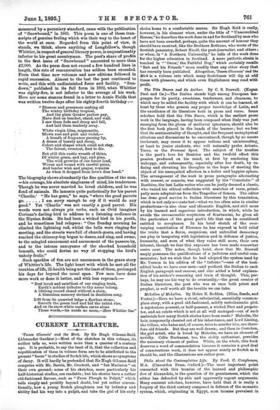The Vita Nueva and its Author. By C. S. Boswell.
(Kogan Paul and Ce.)—The Italian stands high among European lan- guages for its purity, sweetness, tenderness, and clearness, to which may be added the facility with which it can be learned, at least by those who possess any proper knowledge of Latin, and the excellence of its literature both in prose and verse. Some scholars hold that the Vita Nuova, which is the earliest prose work in the language, having been composed when Italy was just emerging from the gloom of medimval ignorance, should also be the first book placed in the hands of the learner ; but we fear that its sentimentality of thought, and the frequent metaphysical allusions and discussions to be encountered, though by no means irrelevant, may cause it to appear tedious and uninteresting, at least to junior students, who will naturally prefer Ariosto, Tasso, or the Promessi Sposi. The subject of the treatise is the poet's love for Beatrice and the twofold effect this passion produced on his mind, at first by rendering him unhappy, and subsequently, especially after her death, by re- fining and elevating his thoughts in the hope of meeting the object of his unrequited affection in a holier and happier sphere. The arrangement of the work in prose paragraphs alternating with canzoni, or sonnets, was suggested by the " Consolatio " of Boethius, the last Latin writer who can be justly deemed a classic, who varied his ethical reflections with snatches of verse, princi- pally mere adaptations from the Tragedies of Seneca. The editor has done good service to Italian literature by this translation, which is not only accurate but—what we too often miss in similar productions—is also clear and idiomatic English, and still more by his learned and sagacious introduction, in which, while he avoids the unreasonable scepticism of Scartazzini, he gives all the particulars of the great poet's life that can be considered entitled to acceptance. In his brief sketch of the ever- varying constitution of Florence he has exposed in bold relief the tricks that a fierce, auspicious, and unbridled democracy can play in tampering with legislation and in defiance of justice, humanity, and even of what they value still more, their own interest, though we fear this exposure has been made somewhat centre cceur. The notes, though brief, show that Mr. Boswell amply possesses the qualifications of a judicious and useful com- mentator; but we wish that he had adopted the system used by Mr. Vernon in his edition of the " Inferno "—one of the best- edited books we have ever seen—and prefixed the Italian to each English paragraph and canzone, and also added a brief explana- tion of his author's reasoning and train of thought. This, per- haps, he may see his way to do eventually,—the great creator of Italian literature, the poet who was at once both priest and prophet, is well worth all the trouble we can take.






































 Previous page
Previous page